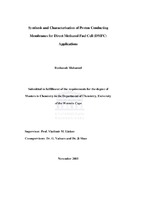| dc.contributor.advisor | Linkov, Vl adimir M. | |
| dc.contributor.advisor | Va ivars, G. | |
| dc.contributor.advisor | Shan, Ji | |
| dc.contributor.author | Mohamed, Rushanah | |
| dc.contributor.other | Dept. of Chemistry | |
| dc.contributor.other | Faculty of Science | |
| dc.date.accessioned | 2013-09-11T12:45:42Z | |
| dc.date.available | 2007/11/06 13:37 | |
| dc.date.available | 2007/11/06 | |
| dc.date.available | 2013-09-11T12:45:42Z | |
| dc.date.issued | 2005 | |
| dc.identifier.uri | http://hdl.handle.net/11394/2089 | |
| dc.description | Magister Scientiae - MSc | en_US |
| dc.description.abstract | For a direct methanol fuel cell (DMFC), the proton exchange membrane must conduct protons and be a good methanol barrier. In addition to the high methanol permeability achieved by these membranes, they are very expensive and contribute greatly to theoverall cost of fuel cell set up. The high cost of the DMFC components is one of the main issues preventing its commercialization. The main objective of this study was thus to produce highly proton conductive membranes that are cheap to manufacture and have low methanol permeability. | en_US |
| dc.language.iso | en | en_US |
| dc.publisher | University of the Western Cape | en_US |
| dc.subject | Fuel cells | en_US |
| dc.subject | Membranes (Technology) | en_US |
| dc.title | Synthesis and characterisation of proton conducting membranes for direct methanol fuel cell (DMFC) applications | en_US |
| dc.type | Thesis | en_US |
| dc.rights.holder | University of the Western Cape | en_US |
| dc.description.country | South Africa | |

